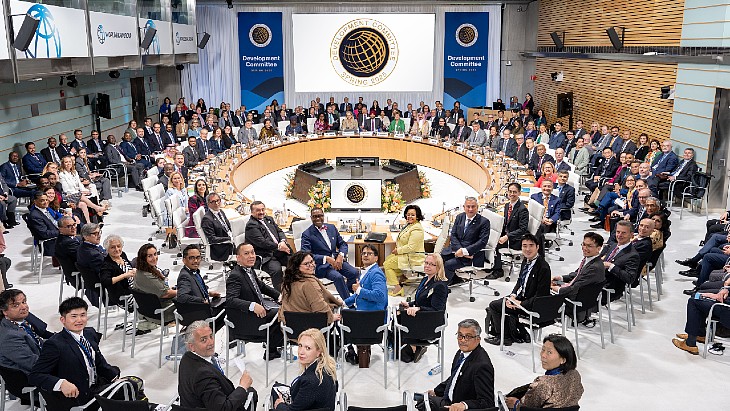Ahead of the organisation's recent Spring meetings, World Bank President Ajay Banga said that he would be seeking executive board approval at their June meeting for a change to an "all-of-the-above" policy on different types of energy, "including nuclear where it makes sense".
The chair of the World Bank's Development Committee, Elisabeth Svantesson, Sweden's Minister for Finance, issued a statement at its spring meeting, saying: "Building a world free of poverty on a livable planet requires decisive policy action to accelerate sustainable and resilient growth, promote macroeconomic stability, foster private sector investment, create more and better jobs, and boost productivity."
She added: "We encourage the WBG (World Bank Group) to explore further options for increased affordable and reliable energy access, including potential support for nuclear energy. We call on the WBG to work with the African Development Bank, regional clients, and other partners to deliver on the promise of Mission 300 to provide reliable energy access to 300 million Africans by the end of the decade."
The Development Committee is described as a "ministerial-level forum of the World Bank Group and the International Monetary Fund for intergovernmental consensus-building on development issues. Known formally as the Joint Ministerial Committee of the Boards of Governors of the Bank and the Fund on the Transfer of Real Resources to Developing Countries, the committee was established in 1974". It has 25 members, usually finance ministers, who represent the full membership of the Bank and Fund.
Its mandate is to "advise the Boards of Governors of the Bank and the Fund on critical development issues and on the financial resources required to promote economic development in developing countries".
Other members of the committee also referenced potential World Bank funding support for new nuclear. France's Economy Minister Eric Lombard said the World Bank "must support client countries in deploying an energy mix compatible with the Paris Agreement and their development objectives. France recalls the interest expressed by many shareholders that the group be in a position to support countries wishing to develop their civilian nuclear energy production".
The USA is the largest shareholder - 17% - in the World Bank and its Treasury Secretary Scott Bessent said: "Ending energy poverty through a focus on energy access and security is vital for enabling private investment and boosting growth. The World Bank and African Development Bank’s joint initiative to expand energy access to 300 million more people in Africa is a welcome contribution to this effort. However, the Bank should be responsive to countries' priorities and needs rather than trying to meet poorly defined and arbitrary climate financing targets. This requires adopting an all-of-the-above approach to energy that also includes gas. We applaud recent announcements that the Bank will seek to remove prohibitions on support for nuclear energy."
Russia's Deputy Prime Minister Alexey Overchuk said: "We see significant opportunities in nuclear energy. While acknowledging the cost and time requirements of such projects, we believe the Bank can play a stronger role in building knowledge and capacity, particularly in the rehabilitation of nuclear plants and the development of small modular reactors. Supporting countries' strategic ambitions on nuclear energy, while instilling confidence in other development partners and the private sector to invest, will facilitate the capital required to achieve enhanced clean and reliable power generation. These efforts should go in-hand with modernisation of transmission systems as well. In this regard, supporting the development of the energy sector through an ecosystem approach is essential for meeting the growing global demand for power in a comprehensive and sustainable way."
Background
The World Bank Group is a multilateral lending organisation whose mission "is to end extreme poverty and boost shared prosperity on a livable planet. This is threatened by multiple, intertwined crises. Time is of the essence". In 2024 the World Bank Group says it facilitated USD117.5 billion "in loans, grants, equity investments and guarantees to partner countries and private businesses".
Although some multinational development banks have provided lending for decommissioning or upgrades to existing nuclear plants, they do not contribute to the financing of new-build projects - the World Bank's only loan for new nuclear capacity was USD40 million in 1959 for Italy's first nuclear power plant. The pledge to aim for a tripling of nuclear energy capacity, backed by more than 30 countries, includes inviting "shareholders of the World Bank, international financial institutions, and regional development banks to encourage the inclusion of nuclear energy in their organisations’ energy lending policies as needed, and to actively support nuclear power when they have such a mandate, and encourage regional bodies that have the mandate to do so to consider providing financial support to nuclear energy".















